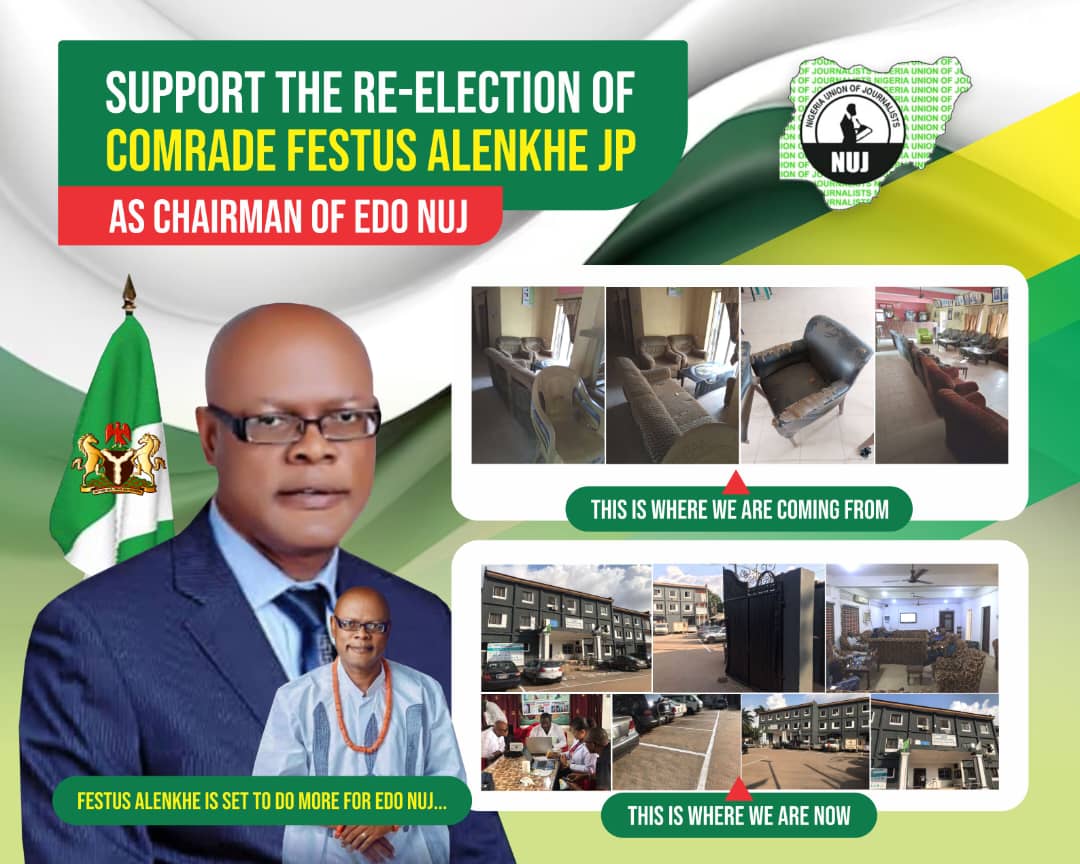_EDITORIAL
As the first tenure of Comrade Festus Alenkhe as Chairman of the Edo State Council of the Nigeria Union of Journalists (NUJ) approaches its conclusion, it is an opportune moment to reflect on the accomplishments that have marked his leadership.
In a sector where journalists often focus on highlighting the successes and failures of others, it is only fitting that we turn the lens inward to assess the significant strides made under the Alenkhe administration.
The initiatives undertaken between 2021 and October 2024 reveal a chairman deeply committed to enhancing the working environment and welfare of journalists in Edo State, while strengthening the infrastructure and reputation of the Press Centre.
From the outset, Alenkhe’s les administration was intent on addressing the basic infrastructural needs of the NUJ Secretariat. His leadership focused on restoring the functionality of the physical space, starting with critical interventions, such as the renovation of toilet facilities and the reactivation of water supply. These measures, often taken for granted in many organizations, underscore a leadership style that prioritizes the day-to-day well-being of its members.
The provision of 24-hour electricity, courtesy of the Ossiomo power project, and a 24-hour internet facility has turned the Press Centre into a hub of productivity and innovation, allowing journalists to work seamlessly and remain competitive in a rapidly digitizing media environment.
One of the highlights of the Alenkhe-led council is its attention to security. The installation of CCTV cameras and the 24-hour patrol by armed security personnel have significantly enhanced the safety of the Press Centre, making it a safer environment for both members and visitors.
Furthermore, the strategic installation of floodlights and the construction of two pillars to support the Secretariat building showcase a proactive approach to both safety and structural integrity. These measures reflect a council that understands the need for long-term planning and investment in the future of the NUJ.
On the welfare front, the Alenkhe led administration has been remarkable. The inclusion of journalists in the Edo State Health Insurance Scheme and the facilitation of financial empowerment through credit facilities with banks demonstrate a commitment to the physical and financial well-being of its members. The 3-day medical outreach and regular health checks have underscored the council’s recognition that journalists, often at the forefront of covering crises, need to prioritize their own health.
Beyond physical infrastructure and welfare, Alenkhe’s leadership has fostered a sense of community among journalists. The introduction of the Annual Edo Journalists Classic Dinner and Picnic since 2022 has not only provided opportunities for relaxation, but has also enhanced camaraderie among media practitioners in the state.
Similarly, the creation of annual awards for investigative journalism and the facilitation of international opportunities—such as visa issuance and passport renewals—are emblematic of a council that seeks to raise the standards of journalism while rewarding excellence within its ranks.
A crucial aspect of Alenkhe’s led administration has been the rebranding of journalists in Edo State. Through training sessions on diverse topics such as drug abuse and first aid, as well as the institution of the Edo Journalists Compendium, the council has worked to enhance both the public image and the professional capacities of its members. The facilitation of appointments for journalists into government committees further solidifies the role of media professionals as crucial stakeholders in governance and policy formulation.
To be modest, the Festus Alenkhe led administration has left an indelible mark on the Edo NUJ. His leadership has been a blend of infrastructural development, welfare enhancement, and professional capacity building. The provision of a brand-new bus, courtesy of Governor Godwin Obaseki, is symbolic of the strong relationships fostered under his leadership, reinforcing the idea that when journalists are empowered, society benefits. As Alenkhe’s first tenure winds up, his administration’s scorecard serves as a testament to what is possible when leadership is focused, pragmatic, and deeply committed to the welfare and progress of its constituency.
The challenge for future leadership will be to build upon these gains and continue to chart a course that prioritizes the needs of journalists while adapting to the evolving dynamics of the media industry.
*BY ANDY EGBON*
*SECRETARY, NUJ, EDO STATE COUNCIL*

